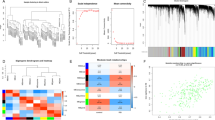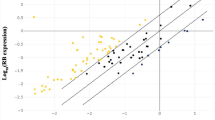Abstract
Retinoblastoma (RB) is an intraocular malignancy with a high incidence and very severe symptoms in children and is a rare life-threatening ophthalmic disease. Screening for key genes in retinoblastoma to identify the main molecular mechanisms of RB pathogenesis. The high-throughput sequencing data GSE111168, gene expression microarray data sets GSE24673 and GSE41321 were obtained from the GEO database. Differential genes were screened using the “limma” package, the threshold was set “padj < 0.05 & |log2FoldChange| ≥ 2”, and the differential gene volcanic map and clustering heat map were drawn. The protein-protein interaction (PPI) network of differentially expressed genes (DEG) was constructed using the STRING database, and followed by functional enrichment analysis to predict biological function. The co-expression analysis obtained the DELs-DEGs relationship pairs, the miRcode website obtained the DEMs-DELs relationship pairs, and the miRDB and miRWalk websites obtained the DEMs-DEGs relationship pairs. According to the ceRNA theory, the DELs-DEMs-DEGs network was obtained by the intersection of pairwise representation of the Venn diagram and imported into Cytoscape software for visualization. PPI network results showed that 20 key genes out of 475 DEGs were likely to serve as new biomarkers to indicate the occurrence, development, and disease staging of retinoblastoma. The ceRNA regulatory network is composed of DELs-DEMs-DEGs consisting of one DEL (LINC00518), one DEM (hsa-miR-129-5p), and three DEGs (FBXO32, MEF2C, WLS). The components of the ceRNA regulatory network have been reported to have abnormal expressions in a variety of cancers, which can affect the growth and metastasis of some cancer cells. These results provide a theoretical basis for the research on the mechanism of retinoblastoma.
Access this chapter
Tax calculation will be finalised at checkout
Purchases are for personal use only
Similar content being viewed by others
References
Mendoza, P.R., Grossniklaus, H.E.: The biology of retinoblastoma. Progress Mol. Biol. Transl. Sci. 134, 503–516 (2015)
Rao, R., Honavar, S.G.: Retinoblastoma. Indian J. Pediatr. 84(12), 937–944 (2017)
Soliman, S.E., Racher, H., Zhang, C., MacDonald, H., Gallie, B.L.: Genetics and molecular diagnostics in retinoblastoma - an update. Asia-Pac. J. Ophthalmol. 6(2), 197–207 (2017)
Rodriguez-Galindo, C., Orbach, D.B., VanderVeen, D.: Retinoblastoma. Pediatr. Clin. North America 62(1), 201–223 (2015)
Dimaras, H., Corson, T.W., Cobrinik, D., et al.: Retinoblastoma. Nat. Rev. Dis. Primers 15021 (2015)
Dimaras, H., Kimani, K., Dimba, E.A.O., et al.: Retinoblastoma. Lancet 379(9824), 1436–1446 (2012)
Eagle, R.C.: The pathology of ocular cancer. Eye (Basingstoke) 27(2), 128–136 (2013)
Esteller, M.: Non-coding RNAs in human disease. Nat. Rev. Genet. 12(12), 861–874 (2011)
Han, J., Lee, Y., Yeom, K.H., Kim, Y.K., Jin, H., Kim, V.N.: The Drosha-DGCR8 complex in primary microRNA processing. Genes Dev. 18(24), 3016–3027 (2004)
Hutvágner, G., Zamore, P.D.: A microRNA in a multiple-turnover RNAi enzyme complex. Science (1979) 297, 5589 (2002)
Bartel, D.P.: Metazoan MicroRNAs. Cell 173(1), 20–51 (2018)
di Leva, G., Garofalo, M., Croce, C.M.: MicroRNAs in cancer. Annu. Rev. Pathol. 9, 287–314 (2014)
Salmena, L., Poliseno, L., Tay, Y., Kats, L., Pandolfi, P.P.: A ceRNA hypothesis: the rosetta stone of a hidden RNA language? Cell 146(3), 353–358 (2011)
Karreth, F.A., Pandolfi, P.P.: CeRNA cross-talk in cancer: when ce-bling rivalries go awry. Cancer Discov. 3(10), 1113–1121 (2013)
Barrett, T., Wilhite, S.E., Ledoux, P., et al.: NCBI GEO: archive for functional genomics data sets - update. Nucleic Acids Res. D991-5 (2013)
Sean, D., Meltzer, P.S.: GEOquery: a bridge between the Gene Expression Omnibus (GEO) and BioConductor. Bioinformatics 23(14), 1846–1847 (2007)
Szklarczyk, D., Gable, A.L., Lyon, D., et al.: STRING v11: protein-protein association networks with increased coverage, supporting functional discovery in genome-wide experimental datasets. Nucleic Acids Res. 47(D1), D607–D613 (2019)
Szklarczyk, D., Gable, A.L., Nastou, K.C., et al.: The STRING database in 2021: customizable protein-protein networks, and functional characterization of user-uploaded gene/measurement sets. Nucleic Acids Res. 49(D1), D605–D612 (2021)
Wu, T., Hu, E., Xu, S., et al.: clusterProfiler 4.0: a universal enrichment tool for interpreting OMICS data. Innovation 2(3), 100141 (2021)
Yu, G., Wang, L.G., Han, Y., He, Q.Y.: ClusterProfiler: an R package for comparing biological themes among gene clusters. OMICS J. Integr. Biol. 16(5), 284–287 (2012)
Yu, G., Wang, L.G., Yan, G.R., He, Q.Y.: DOSE: an R/Bioconductor package for disease ontology semantic and enrichment analysis. Bioinformatics 31(4), 608–609 (2015)
Jeggari, A., Marks, D.S., Larsson, E.: miRcode: a map of putative microrna target sites in the long non-coding transcriptome. Bioinformatics 28(15), 2062–2063 (2012)
Chen, Y., Wang, X.: MiRDB: an online database for prediction of functional microRNA targets. Nucleic Acids Res. 48(D1), D127–D131 (2020)
Sticht, C., de La Torre, C., Parveen, A., Gretz, N.: Mirwalk: an online resource for prediction of microrna binding sites. PLoS ONE 13(10), e0206239 (2018)
Shannon, P., Markiel, A., Ozier, O., et al.: Cytoscape: a software Environment for integrated models of biomolecular interaction networks. Genome Res. 13(11), 2498–2504 (2003)
He, X., Zhang, J.: Why do hubs tend to be essential in protein networks? PLoS Genet. 2(6), e88 (2006)
Liu, Y., He, D., Xiao, M., Zhu, Y., Zhou, J., Cao, K.: Long noncoding RNA LINC00518 induces radioresistance by regulating glycolysis through an miR-33a-3p/HIF-1α negative feedback loop in melanoma. Cell Death Dis. 12(3), 245 (2021)
Luan, W., Ding, Y., Ma, S., Ruan, H., Wang, J., Lu, F.: Long noncoding RNA LINC00518 acts as a competing endogenous RNA to promote the metastasis of malignant melanoma via miR-204-5p/AP1S2 axis. Cell Death Dis. 10(11), 855 (2019)
He, J., Sun, M., Geng, H., Tian, S.: Long non-coding RNA Linc00518 promotes paclitaxel resistance of the human prostate cancer by sequestering miR-216b-5p. Biol. Cell 111(2), 39–50 (2019)
Wang, D.W., You, D., Dong, J., Liu, T.F.: Knockdown of long non-coding RNA LINC00518 inhibits cervical cancer proliferation and metastasis by modulating JAK/STAT3 signaling. Eur. Rev. Med. Pharmacol. Sci. 23(2), 496–506 (2019)
Barbagallo, C., Caltabiano, R., Broggi, G., et al.: Lncrna Linc00518 acts as an oncogene in uveal melanoma by regulating an RNA-based network. Cancers (Basel) 12(12), 3867 (2020)
Yu, X., Song, H., Xia, T., et al.: Growth inhibitory effects of three miR-129 family members on gastric cancer. Gene 532(1), 87–93 (2013)
Xu, S., Yi, X.M., Zhang, Z.Y., Ge, J.P., Zhou, W.Q.: MiR-129 predicts prognosis and inhibits cell growth in human prostate carcinoma. Mol. Med. Rep. 14(6), 5025–5032 (2016)
Tang, X., Tang, J., Liu, X., et al.: Downregulation of MIR-129-2 by promoter hypermethylation regulates breast cancer cell proliferation and apoptosis. Oncol. Rep. 35(5), 2963–2969 (2016)
Zheng, L., Qi, Y.X., Liu, S., Shi, M.L., Yang, W.P.: mir-129b suppresses cell proliferation in the human lung cancer cell lines A549 and H1299. Genet. Mol. Res. 15(4), 1–8 (2016)
Wang, S., Chen, Y., Yu, X., et al.: miR-129-5p attenuates cell proliferation and epithelial mesenchymal transition via HMGB1 in gastric cancer. Pathol. Res. Pract. 215(4), 676–682 (2019)
Wu, Q., Meng, W.Y., Jie, Y., Zhao, H.: LncRNA MALAT1 induces colon cancer development by regulating miR-129-5p/HMGB1 axis. J. Cell. Physiol. 233(9), 6750–6757 (2018)
Han, H., Li, W., Shen, H., Zhang, J., Zhu, Y., Li, Y.: MicroRNA-129-5p, a c-Myc negative target, affects hepatocellular carcinoma progression by blocking the Warburg effect. J. Mol. Cell Biol. 8(5), 400–410 (2016)
Mei, Z., Zhang, D., Hu, B., Wang, J., Shen, X., Xiao, W.: FBXO32 targets c-Myc for proteasomal degradation and inhibits c-Myc activity. J. Biol. Chem. 290(26), 16202–16214 (2015)
Zhou, H., Liu, Y., Zhu, R., et al.: FBXO32 suppresses breast cancer tumorigenesis through targeting KLF4 to proteasomal degradation. Oncogene 36(23), 3312–3321 (2017)
Canté-Barrett, K., Pieters, R., Meijerink, J.P.P.: Myocyte enhancer factor 2C in hematopoiesis and leukemia. Oncogene33(4), 403–410 (2014)
Laszlo, G.S., Alonzo, T.A., Gudgeon, C.J., et al.: High expression of myocyte enhancer factor 2C (MEF2C) is associated with adverse-risk features and poor outcome in pediatric acute myeloid leukemia: a report from the Children’s Oncology Group. J. Hematol. Oncol. 8(1), 115 (2015)
Zhang, H., Liu, W., Wang, Z., et al.: MEF2C promotes gefitinib resistance in hepatic cancer cells through regulating MIG6 transcription. Tumori 104(3), 221–231 (2018)
Zhou, C., Sun, Y., Guo, S., Chen, X., Bao, G., Wang, J.: Wls expression correlates with tumor differentiation and TNM stage in hepatocellular carcinoma. Dig. Dis. Sci. 63(1), 166–172 (2017). https://doi.org/10.1007/s10620-017-4823-4
Zhang, W., Tao, H., Chen, X., Sugimura, H., Wang, J., Zhou, P.: High expression of Wls is associated with lymph node metastasis and advanced TNM stage in gastric carcinomas. Pathol. Int. 67(3), 141–146 (2017)
Shi, Y., Bai, J., Guo, S., Wang, J.: Wntless is highly expressed in advanced-stage intrahepatic cholangiocarcinoma. Tohoku J. Exp. Med. 244(3), 195–199 (2018)
Author information
Authors and Affiliations
Corresponding author
Editor information
Editors and Affiliations
Rights and permissions
Copyright information
© 2023 The Author(s), under exclusive license to Springer Nature Switzerland AG
About this paper
Cite this paper
Guo, J. et al. (2023). Screening of Key Genes in Retinoblastoma and Construction of ceRNA Regulatory Network. In: Wen, S., Yang, C. (eds) Biomedical and Computational Biology. BECB 2022. Lecture Notes in Computer Science(), vol 13637. Springer, Cham. https://doi.org/10.1007/978-3-031-25191-7_12
Download citation
DOI: https://doi.org/10.1007/978-3-031-25191-7_12
Published:
Publisher Name: Springer, Cham
Print ISBN: 978-3-031-25190-0
Online ISBN: 978-3-031-25191-7
eBook Packages: Computer ScienceComputer Science (R0)




